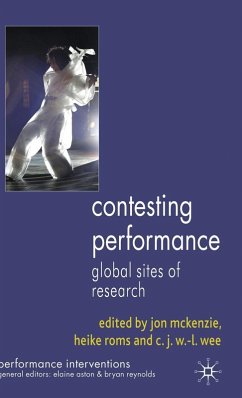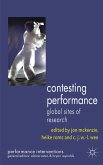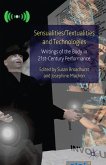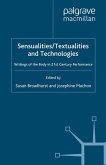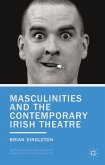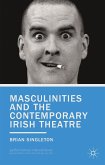Contesting Performance is a collection of essays by international scholars that addresses the global development of performance research in the late twentieth and early twenty-first centuries. The collection functions as a critical reader on diverse approaches to studying performance that contest dominant paradigms of performance studies.
'The book is undoubtedly an important intervention in the organization and expansion of performance research in a global age, highlighting the power structures at play in disciplinary formation.' - The Journal of Theatre Research International
'Performance research has 'gone global', according to this brilliantly diverse edition. This is a bit like saying performance research has 'gone critical', 'gone missing' or 'gone mad', but braver....This book is described, on its cover, as a 'landmark collection of essays by international scholars'. It marks the land as surely as those distinctive pinks, greens and blues did once for international geopolitical forces, but it marks it in such a way as to reveal the gaps that one can fill in for oneself...The best parts of this excellent book are as good as you will find anywhere.' - Contemporary Theatre Review
'This is the great strength of the collection: an assembling of voices and perspectives carefully solicited from, well, if not all corners of the globe, then at the very least a broad sampling...Rather than recapitulate the direction and content of each of those contributions, I would prefer to simply recommend that anyone with an interest in the discipline/field take the time to both work through the essays and, more, to consider how to engage their own, local practice with the conversation to which the collection affords the reader an access.' - Performance Paradigm
'Contesting Performance will be useful in graduate-level courses on performance studies, given its much-needed global perspective in relation to extant field overviews. It will also be of interest to scholars seeking to widen their geographical horizons, as many of the chapters point readers toward archives of understudied national theatre traditions and cultural performance practices around
the globe...the editors have done an admirable job of advocating the need to contest the dominance of a single model of performance studies. Perhaps by design, the book sets the stage for what might follow.' - Glenn Odom, Theatre Journal
'
'Performance research has 'gone global', according to this brilliantly diverse edition. This is a bit like saying performance research has 'gone critical', 'gone missing' or 'gone mad', but braver....This book is described, on its cover, as a 'landmark collection of essays by international scholars'. It marks the land as surely as those distinctive pinks, greens and blues did once for international geopolitical forces, but it marks it in such a way as to reveal the gaps that one can fill in for oneself...The best parts of this excellent book are as good as you will find anywhere.' - Contemporary Theatre Review
'This is the great strength of the collection: an assembling of voices and perspectives carefully solicited from, well, if not all corners of the globe, then at the very least a broad sampling...Rather than recapitulate the direction and content of each of those contributions, I would prefer to simply recommend that anyone with an interest in the discipline/field take the time to both work through the essays and, more, to consider how to engage their own, local practice with the conversation to which the collection affords the reader an access.' - Performance Paradigm
'Contesting Performance will be useful in graduate-level courses on performance studies, given its much-needed global perspective in relation to extant field overviews. It will also be of interest to scholars seeking to widen their geographical horizons, as many of the chapters point readers toward archives of understudied national theatre traditions and cultural performance practices around
the globe...the editors have done an admirable job of advocating the need to contest the dominance of a single model of performance studies. Perhaps by design, the book sets the stage for what might follow.' - Glenn Odom, Theatre Journal
'

